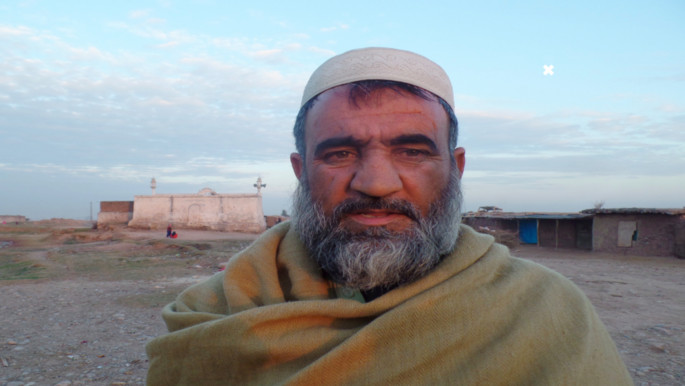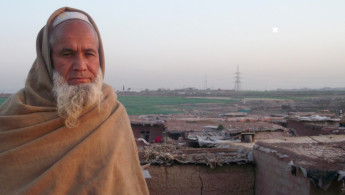Afghan refugees spend decades longing for home
Afghan refugees spend decades longing for home
Thirty-five years on from the Soviet invasion of Afghanistan, refugees in Pakistan struggle as outsiders and long to return home.
5 min read
Afghani refugee Abdul Bashir has lived in refugee camps for 20 years [The New Arab]
Mohammed Sakhi was from the village of Imam Shaib in northern Afghanistan, near the border with Tajikistan.
He fled to Pakistan 35 years ago with his mother and siblings during the Soviet invasion. His village was one of the first to be raided by Russian troops.
The family fled to the east of Afghanistan before crossing the rugged terrain into neighbouring Pakistan.
Sakhi is living with the bitterness of being a refugee for more than three decades and still dreams of returning to Afghanistan, despite the difficult situation in the country.
"We owned a lot of land, and I hoped to study and realise the dreams of my father. But the Soviet invasion destroyed my dreams, a case for hundreds of thousands of our people," he said.
Sakhi's father died when he was very young, leaving him with responsibility for the family.
The family moved from one refugee camp to another, during which his mother died in exile. Sakhi married and fathered nine children, who he hoped would have a better life, but he is unable to provide them with an adequate education.
"Our standard of living was good before we moved to Pakistan, as we own a lot of land," he said. "But after the chaos in the country, and our absence from the village, our land was seized by other residents, and my cousins are now fighting over what is left."
Today, he lives in the suburbs of the city of Rawalpindi, working in a variety of jobs, managing to scrape together five dollars a day.
Sakhi says although the security situation in Pakistan is relatively calm, the family still live as strangers in the country and are harassed by police.
"They ask us for money as soon as they know we are refugees," he said.
His experiences reflect those of many Afghan refugees who have lived in exile for decades.
"I'm afraid to die in a foreign land," said Sida Jen, aged 70, who was one of the first Afghans to flee the Soviet invasion in 1979.
Now in Pakistan, he longs to return to his village outside the city on Kundaz in Afghanistan.
Jen fathered twelve sons and daughters and has numerous grandchildren - whose names he often forgets. For decades he struggled in various menial jobs in Pakistan, but now as his eye-sight fails him in old age, he spends much of his time in prayer.
"I live between the home and the mosque," he said.
"Many of my children share the home, and work all day, earning as much as God provides. I'm happy to see them working, and helping each other," Jen said.
Although he would like to keep financially helping his family by working in the market, his children forbid it for fear of the shame of their father working at his age.
Jen describes Afghanistan as his "beloved" who he wishes to return to, and he reminisces about his childhood and youth in his village.
Yet the security situation prevents him from going to his homeland.
"Who doesn't want to live in their own country? Who doesn't want to end this alienation?" he said.
"The war stops me. I have many relatives in Kunduz who are hoping to leave," he said.
Abdul Bashir, 52, also fled Soviet rule and successive wars in Afghanistan. After living in refugee camps for 20 years, Bashir and his family have been living in "miserable" conditions in the Pakistani city of Rawalpindi.
"Our home is a small room without electricity, gas and water," said Bashir. "My children are suffering from the heat. It is hell in the summer."
Bashir works all day as a vegetable merchant, buying produce from farmers across Pakistan before selling them to local vendors.
His children work with him, selling merchandise through the night, their work interrupted only by prayer. Despite round-the-clock hours, the family earns only eight dollars a day, meaning he can't fulfill his dream of sending his children to school.
"I hope my children could be educated, but the difficult living conditions have prevented this," he said.
"This is the life for the children of the refugees in Pakistan," he said.
Mohamed Osman, 45, also dreams of returning to the mountain ranges where he grew up.
He fled Aghanistan during the Soviet invasion when he was just ten.
"At first my family refused to flee," he said. Yet after Russian troops began to round up young people who refused to join the army, he fled his village with his family.
They crossed the mountains to reach Pakistan, before settling in Gendarmy refugee camp in north-west Pakistan.
He moved to Rawalpindi and now lives in a mud-walled hut, and works selling oranges. Making ten dollars a day, he is able to provide the basics for his family, but is also unable to send his children to school. Two of his sons currently work in Iran, attempting to provide for their family.
Osman wants to return to Afghanistan and build a house in his village, but the security situation prevents it.
"The situation is very tragic... I can't take my family to a country where there is no security."
Osman hopes that peace and stability will one day return to his home country.
"We have been dreaming, and still dream of returning to Afghanistan and rebuilding our homes devestated by war," he said.
He fled to Pakistan 35 years ago with his mother and siblings during the Soviet invasion. His village was one of the first to be raided by Russian troops.
The family fled to the east of Afghanistan before crossing the rugged terrain into neighbouring Pakistan.
Sakhi is living with the bitterness of being a refugee for more than three decades and still dreams of returning to Afghanistan, despite the difficult situation in the country.
"We owned a lot of land, and I hoped to study and realise the dreams of my father. But the Soviet invasion destroyed my dreams, a case for hundreds of thousands of our people," he said.
Sakhi's father died when he was very young, leaving him with responsibility for the family.
 |
|
| Sakhi's family were land-owners before they became refugees [AAAJ] |
"Our standard of living was good before we moved to Pakistan, as we own a lot of land," he said. "But after the chaos in the country, and our absence from the village, our land was seized by other residents, and my cousins are now fighting over what is left."
Today, he lives in the suburbs of the city of Rawalpindi, working in a variety of jobs, managing to scrape together five dollars a day.
Sakhi says although the security situation in Pakistan is relatively calm, the family still live as strangers in the country and are harassed by police.
"They ask us for money as soon as they know we are refugees," he said.
His experiences reflect those of many Afghan refugees who have lived in exile for decades.
"I'm afraid to die in a foreign land," said Sida Jen, aged 70, who was one of the first Afghans to flee the Soviet invasion in 1979.
Now in Pakistan, he longs to return to his village outside the city on Kundaz in Afghanistan.
Jen fathered twelve sons and daughters and has numerous grandchildren - whose names he often forgets. For decades he struggled in various menial jobs in Pakistan, but now as his eye-sight fails him in old age, he spends much of his time in prayer.
"I live between the home and the mosque," he said.
"Many of my children share the home, and work all day, earning as much as God provides. I'm happy to see them working, and helping each other," Jen said.
Although he would like to keep financially helping his family by working in the market, his children forbid it for fear of the shame of their father working at his age.
 |
|
| Jan was one of the first to flee Aghanistan after the soviet invasion [AAAJ] |
Yet the security situation prevents him from going to his homeland.
"Who doesn't want to live in their own country? Who doesn't want to end this alienation?" he said.
"The war stops me. I have many relatives in Kunduz who are hoping to leave," he said.
Abdul Bashir, 52, also fled Soviet rule and successive wars in Afghanistan. After living in refugee camps for 20 years, Bashir and his family have been living in "miserable" conditions in the Pakistani city of Rawalpindi.
"Our home is a small room without electricity, gas and water," said Bashir. "My children are suffering from the heat. It is hell in the summer."
Bashir works all day as a vegetable merchant, buying produce from farmers across Pakistan before selling them to local vendors.
His children work with him, selling merchandise through the night, their work interrupted only by prayer. Despite round-the-clock hours, the family earns only eight dollars a day, meaning he can't fulfill his dream of sending his children to school.
"I hope my children could be educated, but the difficult living conditions have prevented this," he said.
"This is the life for the children of the refugees in Pakistan," he said.
 |
|
| Mohamed Osman wants to build a house in his home village [AAAJ] |
He fled Aghanistan during the Soviet invasion when he was just ten.
"At first my family refused to flee," he said. Yet after Russian troops began to round up young people who refused to join the army, he fled his village with his family.
They crossed the mountains to reach Pakistan, before settling in Gendarmy refugee camp in north-west Pakistan.
He moved to Rawalpindi and now lives in a mud-walled hut, and works selling oranges. Making ten dollars a day, he is able to provide the basics for his family, but is also unable to send his children to school. Two of his sons currently work in Iran, attempting to provide for their family.
Osman wants to return to Afghanistan and build a house in his village, but the security situation prevents it.
"The situation is very tragic... I can't take my family to a country where there is no security."
Osman hopes that peace and stability will one day return to his home country.
"We have been dreaming, and still dream of returning to Afghanistan and rebuilding our homes devestated by war," he said.



